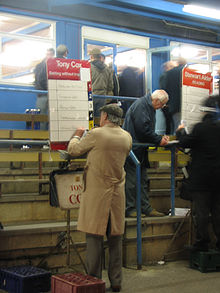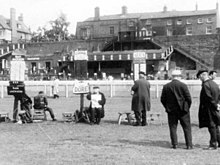Bookmaker
![]()
This article or subsequent section is not sufficiently supported by evidence (e.g., anecdotal evidence). Information without sufficient evidence may be removed in the near future. Please help Wikipedia by researching the information and adding good supporting evidence.
A bookmaker (or bookie for short) offers bets with fixed or variable odds on the outcome of future events, especially sporting events. This type of gambling is particularly widespread at horse races, football, ice hockey and basketball matches, and in England it is also traditionally used at almost all public events.
As a betting provider, the bookmaker guarantees with his name for the payment of the winnings at the odds and betting stakes in his book. Since in the digital age a large proportion of bets can be placed more quickly via providers on the internet, the classic acceptance points are losing importance.
This activity can be legal or illegal ("black bookmaker"). In Germany, a bookmaker needs an official permit to legally accept bets ("licensed bookmaker" for horse racing only). Currently, many bookmakers or bookmaking companies are based in tax havens or in countries with a liberal gambling tradition such as the United Kingdom of Great Britain and Northern Ireland, Gibraltar or Malta. The legal assessment of bookmakers who broker sports betting on the internet across national borders is in a grey area. The international enforcement of legal claims is practically disproportionate to the damage complained of.
To be distinguished from the bookmaker is the totalisator, who arranges bets via totalisator, but does not act as betting opponent.

A bookie at a dog race in Reading, England

Between Wales and London
To the mathematics
For example, the bookmaker offers fixed odds on a win, a draw or a loss for team sports events. An odds indicates the ratio of the stake to the possible profit: for example, "pay 2.50 for 1 euro stake". The bookmakers can change variable odds at any time. However, bets that have been placed retain the agreed odds that applied when the bet was placed.
The multiplication of the odds with the bet gives the possible profit.
The bookmaker may be taking large risks as he is dealing in probabilities and often large bets. To limit the risk, bookmakers offer bets on all possible outcomes so that they ideally make their profit through arbitrage. To avoid high risk of loss on unbalanced bets, the bookmaker may, for example, limit the size of the bets or reinsure on international betting exchanges. As a rule, however, the bookmaker operates an extremely profitable business.
The bookmaker has an advantage over the bettor because he does not have to predict the correct outcome for his winnings. His task is to correctly estimate the percentage of bets for the various betting outcomes and to calculate the odds based on this. By looking at his "books", the bookmaker can constantly see how the bets placed are distributed in percentage terms. He can adjust the odds at any time. Similar to election projections, he then arrives at very precise statements regarding the betting predictions of the bettors with very small random samples. Large bookmaking companies work with extensive statistical material and methods.
With "fair odds", the bookmaker would have to pay out all the money of the losers to the winners. Of course, however, the real odds are below this, resulting in the bookmaker's profit: the bookmaker margin. The "counterpart" to this - the payout ratio - is between 50% and 60% at the German ODDSET. With many other (especially private) bookmakers, payout ratios of over 90% are not uncommon. The payout ratio can be calculated on the basis of the odds offered, assuming that it is the same for each outcome. This is done by adding the reciprocals of the odds. The payout ratio is the reciprocal of this sum (harmonic mean), for example 1 for a payout of 100%. In a 2-way bet, for two players of equal value, both are offered the odds of 1.95 to win. 1/1.95 + 1/1.95 = 0.5128 + 0.5128 = 1.02564 → 1/1.02564 = 0.975 = 97,5 %. This means there is a very small bookmaker margin of 2.5% in these odds. If only 1.80 is offered for the two players, that means a margin of 10%.
Online Bookmaker
Since the turn of the millennium and the rapid development of the internet, a large number of online bookmakers have established themselves, which offer their services globally. Customers can register on the website of the online bookmaker and then place their bets online. Normally, the money transfer is done through the usual ways on the internet such as e-wallets, credit cards and bank transfers. In order to position themselves against their competitors (the number of sports betting providers operating on the Internet has long since exceeded 100), online bookmakers advertise their offers with various bonus and cashback programmes. Particularly during the 2012 European Championship, there was an increase in advertising for online bookmakers on German-language television (both private and public).
Questions and Answers
Q: Who is a bookmaker?
A: A bookmaker is a person or company that collects bets for sporting events.
Q: How does a bookmaker work?
A: A bookmaker collects bets for sporting events and pays out winnings when the chosen team wins or the event happens.
Q: What is the most popular bet placed with a bookmaker?
A: The most popular bet placed with a bookmaker is for the winning team.
Q: What is the role of a bookmaker in the UK and Ireland?
A: Bookmakers are very popular in the UK and Ireland and they collect bets for various sports and events.
Q: What are some sports in which bets are made with bookmakers?
A: Most bets are made in sports like football, horse racing and rugby.
Q: Can bets be placed on events other than sports with a bookmaker?
A: Yes, some bets can be placed for events too like Oscar or presidential winners.
Q: Who was the first bookmaker and when did he start?
A: The first bookmaker was Harry Ogden, who opened his bookmaking business in the 1790s.
Search within the encyclopedia